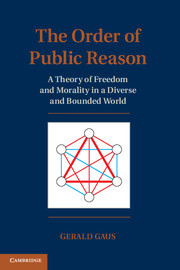Book contents
- Frontmatter
- Contents
- Preface
- I The Fundamental Problem
- PART ONE SOCIAL ORDER AND SOCIAL MORALITY
- II The Failure of Instrumentalism
- III Social Morality as the Sphere of Rules
- IV Emotion and Reason in Social Morality
- PART TWO REAL PUBLIC REASON
- Concluding Remarks on Moral Freedom and Moral Theory
- Appendix A The Plurality of Morality
- Appendix B Economic Freedom in States that Best Protect Civil Rights
- Bibliography
- Index
III - Social Morality as the Sphere of Rules
Published online by Cambridge University Press: 03 May 2011
- Frontmatter
- Contents
- Preface
- I The Fundamental Problem
- PART ONE SOCIAL ORDER AND SOCIAL MORALITY
- II The Failure of Instrumentalism
- III Social Morality as the Sphere of Rules
- IV Emotion and Reason in Social Morality
- PART TWO REAL PUBLIC REASON
- Concluding Remarks on Moral Freedom and Moral Theory
- Appendix A The Plurality of Morality
- Appendix B Economic Freedom in States that Best Protect Civil Rights
- Bibliography
- Index
Summary
[I]t is a condition of the existence of any form of social organization, of any human community, that certain expectations of behaviour on the part of its members should be pretty regularly fulfilled: that some duties, one might say, should be performed, some obligations acknowledged, some rules observed. We might begin by locating the sphere of morality here. It is the sphere of the observance of rules.
P. F. Strawson, “Social Morality and Individual Ideal”Man is as much a rule-following animal as a purpose-seeking one.
F. A. Hayek, Rules and OrderThe instrumentalists have shown that social life among individuals devoted to diverse ends and values is permeated by interactions in which, if each person seeks to best promote her own goals, all will be worse off. It is again worth pointing out that for all its problems, the instrumentalist project is based on the insight that we no longer can be complacent that, of course, the restraints of morality are worthy of our respect, and, of course, we should submit to the authority of morality. Gauthier and his fellow instrumentalists grapple head-on with the foundationalist crisis of morality (§4.1). Social morality has a fundamental task to perform; unless we can put aside our instrumentalist optimization strategies, we cannot achieve a cooperative social life. But, we have seen, the instrumentalist cannot show (to use a currently popular phrase), how we can “bootstrap” effective constraints out of our goal-promoting reasoning.
- Type
- Chapter
- Information
- The Order of Public ReasonA Theory of Freedom and Morality in a Diverse and Bounded World, pp. 101 - 182Publisher: Cambridge University PressPrint publication year: 2010



